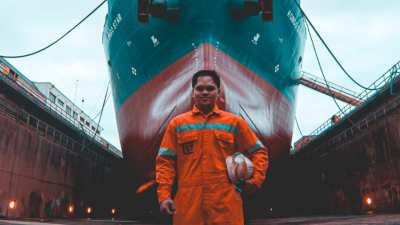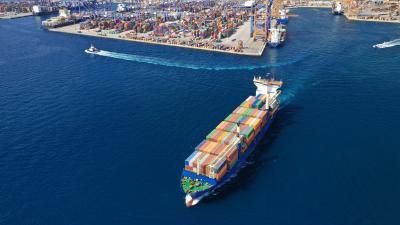
Training seafarers for a decarbonised future
Maritime Just Transition Task Force collaborative project sets framework to equip seafarers with skills as shipping transitions to zero emissions.
This page is approximately a 5 minute read
This page was published on

of global trade by volume is carried by sea.
Transforming global shipping is a critical part of reaching the Paris Agreement target of limiting global warming to 1.5°C and building zero emission, resilient global supply chains that we all rely on.
Today more than 90% of global trade by volume is carried by sea, and yet it remains a major contributor to greenhouse gases (GHS), with maritime vessels responsible for 3% of the world’s annual GHG emissions.
Following the recent agreement by member states of the International Maritime Organisation (IMO) at the 80th Marine Environment Protection Committee (MEPC) meeting to adopt the 2023 strategy on the reduction of harmful Greenhouse Gas emissions, the industry is committed to taking action to reduce its impact on the planet. The new strategy focuses on ensuring the uptake of zero or near-zero GHG emissions fuels by 2030 and includes checkpoints for further progress by 2040 achieving net-zero close to 2050.
In 2021, Lloyd’s Register Foundation funded the appointment of Lloyd’s Register’s Global Sustainability Manager, Katharine Palmer as the Maritime Lead for the Climate Champions Team. This secondment was activated through the LR Maritime Decarbonisation Hub (MDH) - a joint initiative between Lloyd’s Register and Lloyd’s Register Foundation, created to help the maritime industry design, develop, and commercialise safe pathways to future fuels required for decarbonisation. The appointment underlines the Foundation’s commitment to capacity building in programmes and initiatives which focus on creating a safer and more sustainable ocean industry.
Over the last two years, Katharine has helped put shipping center stage, engaging with global networks to mobilise non-state actors across the maritime value chain to make commitments and accelerate action across stakeholders, geographies, and shipping sectors to make the tipping point of at least 5% zero-carbon fuels, a critical point of transition in international shipping, a reality.
A core campaign of the UN Climate Change High-Level Champions is the ‘Race to Zero' - a global campaign to rally leadership and support from businesses, cities, regions, investors for a healthy, resilient, zero carbon recovery that prevents future threats, creates decent jobs, and unlocks inclusive, sustainable growth. Race to Zero mobilizes a coalition of leading net-zero initiatives, representing 11,309 non-state actors including 8,307 companies, 595 financial institutions, 1,136 cities, 52 states and regions, 1,125 educational institutions and 65 healthcare institutions (as of September 2022).
“It has been an exciting time to be in the Race to Zero, being part of a community working across regions and sectors, to share knowledge, tools, and solutions to get shipping on course to zero by 2050 whilst keeping our global supply chains safe and resilient,” says Katharine.
“Reflecting on the progress so far, between COP26 to COP27, such as the launch of the Maritime Just Transition Task Force or being the first sector to develop a set of resilience breakthroughs with a complementary mitigation 2030 Breakthrough, I am proud of the whole-systems approach and work that has been achieved. We have been able to pinpoint clear goals, converge actors, build communities, and are now at a turning point to drive action and implementation, and ultimately show the maritime sector as an enabler and source of climate solution.”
With over 20 years’ experience in the shipping industry, Katharine is a recognised sustainability expert and established thought leader in climate change, decarbonisation, and the energy transition in the maritime sector. Her work with the Climate Champions Team has brought forward critical commitments across civil society to our shared climate goals, and she continues to be a catalyst of change in the race to make zero-emission vessels commercially safe and sustainable by 2030.
“We have seen a huge leap forward in the increase in engagement across the industry. COP27 saw shipping’s climate actions highlighted past our expectations, however, the next steps in achieving the 2030 Breakthrough goals and beyond remains an impressive challenge. It is important that there is further collaboration across the entire maritime value chain, focusing on a whole systems approach as we prioritise coordinating individual efforts taking place from maritime actors to fully deliver the step change” says Katharine.
“2023 is a critical year with the adoption of the IMO 2023 GHG Strategy keeping 1.5 within reach and at COP28 in the UAE, we will have the first global stock take against the goals of the Paris Agreement. There should be no doubt of the leading role that a just, equitable, and resilient transition will play as we enter a unique window of opportunity to bring non-state actor action to policy makers to rapidly create the enabling environment for implementation in this evolving industry.
“As we push for a more consolidated action agenda, guided by a common framework, and set of targets to coordinate action at scale, the opportunity for change is now. As shipping is seen more and more as a source of climate solution and a key sector to lead the way, I am truly excited to see what’s next.”
“Katharine has been instrumental in convening dialogue across the maritime sector and shining a light on the need for ambitious, transformative change in shipping. Her appointment is just one example of how Lloyd's Register Foundation is contributing to the maritime transition, underpinned by our rich heritage with Lloyd’s Register and current initiatives such as the Maritime Decarbonisation Hub. We will continue to create a safer and more sustainable future for shipping and contribute to addressing society’s global challenge of climate change mitigation.
We are now investing in additional roles to further support the UN Climate Change High-Level Champion's team, as they move the maritime sector towards safe decarbonisation as part of COP28 and beyond.”
Dr Ruth Boumphrey, Chief Executive at Lloyd's Register Foundation
To find out more about the UN Climate Change High-Level Champions visit: https://climatechampions.unfccc.int/
For more information on the LR Maritime Decarbonisation Hub visit: https://www.lr.org/en/expertise/marine-energy-transition/maritime-decarbonisation-hub/